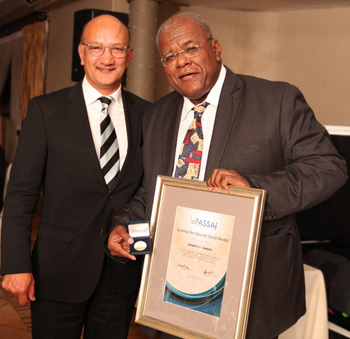 Prof Jonathan Jansen and prof Daya Reddy |
The Vice-Chancellor and Rector of the University of the Free State (UFS), Prof Jonathan Jansen, was honoured by the Academy of Science of South Africa (ASSAf). He received ASSAf’s Science-for-Society Gold Medal for outstanding achievement in scientific thinking to the benefit of society. Prof Jansen said, "I am so inspired by the award of the Academy Gold Medal, for it recognises the power of science and scholarship to improve the human condition."
A further highlight at ASSAf’s annual prestige awards ceremony, was when two academics from the UFS were inducted.
Prof Jeanet Conradie from the Department of Chemistry and Dr Aliza le Roux from the Department of Zoology and Entomology on the UFS Qwaqwa Campus were two of the 23 new members of ASSAf that were inducted.
One of ASSAf’s core functions is to honour the country’s most outstanding scholars by electing them to membership of the academy. Members are the core asset of the academy and voluntarily give of their time and expertise. Through election to membership, ASSAf recognises scholarly achievement.
ASSAf is the official national academy of science and represents the country in the international community of science academies. As collective resource, the academy enables the generation of evidence-based solutions to national problems.